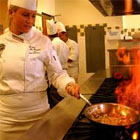I spent the five happiest years of my life in a morgue. As a forensic scientist in the Cleveland coroner’s office I analyzed gunshot residue on hands and clothing, hairs, fibers, paint, glass, DNA, blood and many other forms of trace evidence, as well as crime scenes. Now I'm a certified latent print examiner and CSI for a police department in Florida. I also write a series of forensic suspense novels, turning the day job into fiction. My books have been translated into six languages.
Wow, that's kind of hard, possibly because we in forensics don't 'solve' cases, the detective does. We provide them the information that hopefully solves or helps to solve the case. Some that took a surprisingly short time: we had a would-be rapist drop his wallet at the scene. I recently had a burglary/arson/car theft in which I had some decent fingerprints, but they didn't match anyone in our city database. The detective had no leads at all and no idea where the car was. Then as is routine I checked the prints against the neighboring city's database, and got a hit, they questioned the suspect and he confessed. In my small town we often have the killer waiting at the scene and telling us that they did it. However, after sitting in jail for a while they may decide they were justified, so the legal trial may not even begin until 2-3 years later. One that took longer: we had the brutal double murder of a woman and a young girl in 1989. Despite a copious investigation of every friend, acquaintance, fingerprint or hair involved, no leads. Then two years ago a man was arrested on a relatively minor charge and his DNA was searched and hit on the unsolved murder. Hope that helps!
titles and job requirements aren't uniform, so the only way to know is to call the crime labs in your area or whereever you might be interested in working and ask them. You can also go on the websites for professional organizations such as the American Academy of Forensic Sciences and check out their job vacancy postings and see what the various positions require. Good luck.
My guess would be 0.Mostly it’s just kids wanting me to answer their homework questions.
Sure, email me at lisa-black@live.com.
Cruise Ship Officer
 Is the "women and children first" rule still in effect?
Is the "women and children first" rule still in effect?
Chef
 Do you get offended when a customer sends back a dish?
Do you get offended when a customer sends back a dish?
Pharmaceutical Researcher
 Is there or isn't there a cure for AIDS?
Is there or isn't there a cure for AIDS?
I have a degree in biology because they didn't have forensic science degrees at that time. I would think any natural science is a good basis for the field. A friend of mine who teaches at Miami-Dade recommends Miami-Dade, of course; also the University of New Haven, and Keiser University has some good programs.
No.
If you want to be a pathologist you will have to be a doctor, and will need to go to med school. So you are looking for a pre-med program. Best of luck!
-OR-
 Login with Facebook
Login with Facebook (max 20 characters - letters, numbers, and underscores only. Note that your username is private, and you have the option to choose an alias when asking questions or hosting a Q&A.)
(A valid e-mail address is required. Your e-mail will not be shared with anyone.)
(min 5 characters)
By checking this box, you acknowledge that you have read and agree to Jobstr.com’s Terms and Privacy Policy.
-OR-
 Register with Facebook
Register with Facebook(Don't worry: you'll be able to choose an alias when asking questions or hosting a Q&A.)